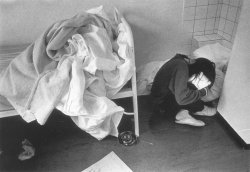jUVENILE DELINQUENCY

Late one July night a group of seven Kryvy Rih teenagers, included four girls and three boys aged 13 to 16, brutally beat a fifty-year old homeless man. After finishing with the beating by dawn, they poured gasoline over the man, who was still alive at the time, and set him on fire. All participants of the tragedy were children from single-parent and problem families.
Department Head of the Interior Ministry for Juvenile Delinquency Oleksandr Novikov told The Day that for the last eight months, Ukrainian teenagers have committed 179 murders, 144 rapes, 207 severe beatings, and 612 robberies.
Experts unanimously quote the same causes of children brutality. Ukrainian Child Protection Committee Chair, attorney Natalia Petrova, notes that a child subjected to abuse in his family will often try to avenge it, and the victim chosen is not necessarily the person who traumatized the child. Another important factor is the so-called “herd instinct”—teenagers’ openness, susceptibility to external influences, and identification of their place in life with their role in a peer group. Executive Secretary of the Ukrainian Association of Psychiatrists Semen Hluzman points out that there is virtually no monitoring of the mental health of children and teenagers in the country. “Our society is neurotic in general, and we have gotten used to it,” said Mr. Hluzman at a conference on psychiatric issues in October 7 in Kyiv.
...Three delinquents brutally beat three women and a man in their home. Svitlana Steshenko, whose body was cut and stabbed 19 times, died on the spot. Anatoly Bondar, who had four knife wounds in his abdomen, died the following morning. Tamara Vnukova and Nadiya Airopetian suffered enormous stress and some bodily injuries. Such is the aftermath of the dreadful night...
The following morning, our “heroes” went to the train station as if nothing had happened. “We missed our train,” said Tetiana. “So we decided to go to the movies. When we came back, we were detained by the police.”
“The investigation was complicated by the fact that the detained teenagers could not tell us their exact age, and we did not have any other source available that would indicate it to us,” said Vasyl Horobets, Head of the Criminal Investigations Department of Chernihiv Oblast Prosecutor’s Office. “Their age had to be determined by forensic medical examination.”
Vasyl Horobets cannot recall any other acts of such brutality committed by persons who have not reached the age of legal responsibility.
“Legal responsibility for such acts starts at the age of 14. The law stipulates only disciplinary actions for 11 to 14 year-old delinquents who commit grave misdemeanors.”
The Day’s Commentary
Oleh Nasinnyk, member of the Ukrainian Association of Psychiatrists’ Governing Board:
“Youngsters between ages 13 and 16 are the most aggressive. Unfortunately, because of insufficient funding, Ukraine does not conduct socio-psychological research, and we do not know the exact number of adults and children prone to neurasthenia.
“I believe that our children’s bitterness is caused first and foremost by their loneliness and moral and spiritual discontent. As a rule, parents today do not have enough time to interact with their children. At the end of a hard working day, they often vent all their negative energy at their son or daughter, punishing and humiliating them without reason.
“Over the last few years, schools have also been paying much less attention to children since teachers do not feel obliged to work to the best of their ability for a meager salary. Interest clubs, art studios and sport facilities that used to attract quite a few children no longer exist. There, children also had a chance to meet peers that shared the same interests with them.
“Children have nobody to talk to about their problems, and this is why, in an attempt to draw adults’ attention to them, they commit acts which they will probably regret in their adulthood. They withdraw into themselves, avoid interaction with the outside world, and sometimes even commit suicide.
“Before 1988, we did two preventive health examinations a year in all schools, but now we do not have money for it. Ukrainians are still not used to the idea of seeking professional help from a psychiatrist or a psychologist. Even if parents do see that their child is embittered and irritable, most often they think it will go away in due time.”
Выпуск газеты №:
№38, (1998)Section
Day After Day





